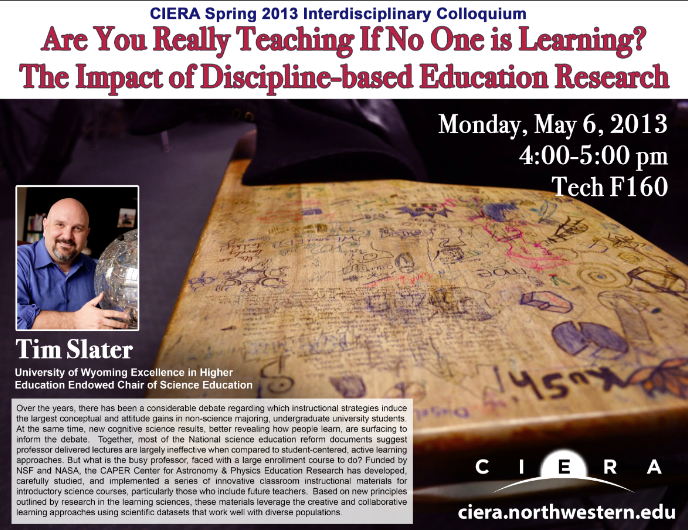Research Events | CIERA Quarterly Interdisciplinary Colloquia | 2012-2013
| CIERA Spring Interdisciplinary Colloquium 2013 |
| May 6th 4:00pm Tech F160 |
Dr. Tim Slater (University of Wyoming Excellence in Higher Education Endowed Chair of Science Education)
Impact of Discipline-based Education Research |
|
Over the years, there has been a considerable debate regarding which instructional strategies induce the largest conceptual and attitude gains in non-science majoring, undergraduate university students. At the same time, new cognitive science results, better revealing how people learn, are surfacing to inform the debate. Together, most of the National science education reform documents suggest professor delivered lectures are largely ineffective when compared to student-centered, active learning approaches. But what is the busy professor, faced with a large enrollment course to do? Funded by NSF and NASA, the CAPER Center for Astronomy & Physics Education Research has developed, carefully studied, and implemented a series of innovative classroom instructional materials for introductory science courses, particularly those who include future teachers. Based on new principles outlined by research in the learning sciences, these materials leverage the creative and collaborative learning approaches using scientific datasets that work well with diverse populations.
http://www.uwyo.edu/seced/faculty-staff/timothy-slater.html |
 |
| CIERA Winter Interdisciplinary Colloquium 2013 |
| March 5th 4:00pm Tech F160 |
Dr. David Hogg (New York University)
The Astronomer's Theory of Everything |
|
Astrophysics has many problems in which there are millions to billions of parameters, but at the end of the day there are only dozens to thousands of "hyper-parameters" that are of great interest. I discuss problems in cosmological parameter measurement and exoplanet discovery and characterization in which we are working towards inference in billion-parameter models (think: multiple parameters for every star in the Milky Way, every exoplanet around every star, and every galaxy in the Hubble Volume, not to mention camera and device calibration). For some problems we are working to optimize a regularized likelihood and in others we are marginalizing out (enormous numbers of) nuisance parameters with MCMC. If we succeed in fitting models at this scale we will greatly improve our ability to make novel discoveries and precise measurements with noisy data. We will also have an exceedingly heavy "theory of everything". I will show some successes, but I won't show the result of any billion-parameter inference just yet (sorry!); some engineering and operational issues will be discussed. This is work with Jo Bovy, Rob Fergus, Dan Foreman-Mackey, Jonathan Goodman, Fengji Hou, Dustin Lang, and many others.
http://cosmo.nyu.edu/hogg/ |
 |
| CIERA Fall Interdisciplinary Colloquium 2013 |
| Nov. 30th 11:00 am Tech F160 |
Prof. Alyssa Goodman (Harvard University)
(or, why good high-dimensional data visualization can solve almost any problem!) |
|
This talk will explore the role of high-dimensional data visualization in a variety of research areas. In fields as diverse as Astronomy, Medicine, Geology, and Genomics, the progress of research is now limited more by the speed of data analysis and understanding than it is by data acquisition. Rich online resources offer not only ever-larger tables of numbers, but also images, movies, and other high-dimensional data streams. And, most results of previous research are available on-demand thanks to a growing wealth of digitized literature. The talk will offer real-world scenarios, focusing in particular on examples from Astronomy (including sea monsters in the sky) and Medicine (including how your doctor should look at your heart), where high-dimensional linked-view data visualization tools, such as the WorldWide Telescope and Glue software packages, have quickened the pace of insight.
https://www.cfa.harvard.edu/~agoodman/
|
 |
Past CIERA Interdisciplinary Colloquia